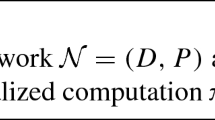Summary
We investigate the power of a broadcast mechanism in a distributed network. We do so by considering the problem of synchronizing clocks in an errorfree network, under the assumption that there is no upper bound on message transmission time, but that broadcast messages are guaranteed to be received within an interval of size ε, for some fixed constant ε. This is intended to be an idealization of what happens in multiple access networks, such as the Ethernet. We then consider tradeoffs between the type and number of broadcasts, and the tightness of synchronization. Our results include (1) matching upper and lower bounds of (1+1/K)ε on the precision of clock synchronization attainable forn≧3 process usingK (n−1)-casts, 3≦K≦n, (2) matching upper and lower bounds of (1+1/n)ε on the precision of clock synchronization attainable forn≧3 processes using an arbitrary number of (n−1)-casts, and (3) matching upper and lower bounds of (1+n−2/n)ε on the precision attainable using 2-casting.
Similar content being viewed by others
References
Babaoglu Ö, Drummond R: (Almost) no cost clock synchronization. Proceedings of the 17th Int Symp on Fault-Tolerant Computing, pp 42–47, 1987
Babaoglu Ö, Stephenson P, Drummond R: Reliable broadcast and communication models: tradeoffs and lower bounds. Distrib Comput 2(4):177–189 (1988)
Cheriton D: The V distributed system. Commun ACM 31(3):314–332 (1988)
Dolev D, Dwork C: On-the-fly generation of names and communication primitives. (unpublished manuscript, 1990)
Dolev D, Halpern J, Strong R: On the possibility and impossibility of achieving clock synchronization. J Comput Syst Sci 32:230–250 (1986)
Fischer MJ, Lynch NA, Meritt M: Easy impossibility proofs for distributed consensus problems. Distrib Comput 1(1):26–39 (1986)
Gray JN: The cost of messages. Proceedings of the 7th ACM Symposium on Princiles of Distributed Computing, pp 1–7, 1988
Halpern J, Megiddo N, Munshi A: Optimal precision in the presence of uncertainty. J Complexity 1:170–196 (1985)
Halpern J, Simons B, Strong R, Dolev D: Fault-tolerant clock synchronization. Proceedings 3rd Annual ACM Symposium on Principles of Distributed Computing, pp 89–102. Vancouver, Canada, 1984.
Lamport L: Time, clocks, and the ordering of events in a distributed system. Commun ACM 21(7):558–565 (1978)
Lamport L, Melliar-Smith PM: Synchronizing clocks in the presence of faults. J ACM 32(1):52–78 (1985)
Lundelius J, Lynch N: An upper and lower bound for clock synchronization. Inf Control 62:190–204 (1984)
Lundelius J, Lynch N: A new fault-tolerant algorithm for clock synchronization. Inf Computation 77:1–36 (1988)
Metcalf R, Boggs D: Ethernet: distributed packet switching for local computer networks. Commun ACM 19(7):395–404 (1976)
Srikanth TK, Toueg S: Optimal clock synchronization. J ACM 34(3):626–645 (1987)
Sugihara K, Suzuki I: Nearly optimal clock synchronization under unbounded message transmission time. Proceedings 1988 International Conference on Parallel Processing III, pp 14–17. St. Charles, Illinois, 1988
Author information
Authors and Affiliations
Additional information
Joseph Y. Halpern received a B.Sc. in mathematics from the University of Toronto in 1975, and a Ph.D. in mathematics from Harvard University in 1981. In between, he spent two years as the head of the Mathematics Department at Bawku Secondary School in Ghara. After a year as a visiting scientist at MIT, he joined IBM in 1982, where he is currently a research staff member, as well as being a consulting professor at Stanford University. He was manager of the mathematics and related computer sience department at IBM from 1987–1989. He was program chairman and organizer of the first conference on Theoretical Aspects of Reasoning About Knowledge in 1986, program chairman of the 1986 ACM Symposium on Principles of Distributed Computing and of the 1991 ACM Symposium on Theory of Computing. He was recipent (together with Ron Fagin) of the MIT Publisher's Prize for best paper at the 1985 International Joint Conference on Artificial Intelligence and again winner of the Publisher's Prize at the 1989 International Joint Conference on Artificial Intelligence.
Ichiro Suzuki is an Associate Professor of Computer Science at the University of Wisconsin-Milwaukee. He received a D.E. degree in information and computer sciences from Osaka University, Japan, in 1983. His major research interests are distributed systems and computational geometry.
This author was supported in part by the National Science Foundation under grant CCR-9004346
Rights and permissions
About this article
Cite this article
Halpern, J.Y., Suzuki, I. Clock synchronization and the power of broadcasting. Distrib Comput 5, 73–82 (1991). https://doi.org/10.1007/BF02259749
Received:
Accepted:
Issue Date:
DOI: https://doi.org/10.1007/BF02259749




